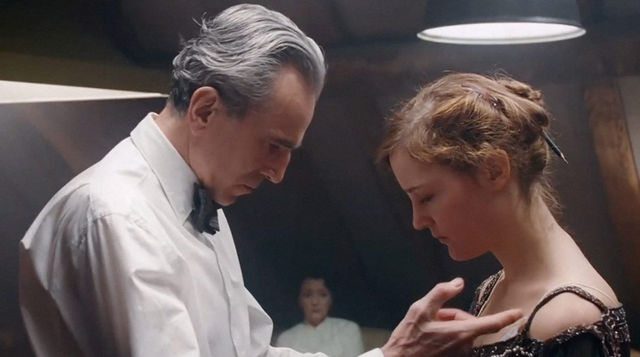It seems only fitting that Phantom Thread marks Daniel Day-Lewis’s retirement from acting. After all, the role of Reynolds Woodcock appears to have been tailored for the infamously rigorous actor’s nature.
Set in 1950’s London, the story begins with Woodcock and his sister, Cyril (Lesley Manville), running a very successful dressmaking business that boasts an impressive clientele. He dresses British film stars and Belgian royalty alike, while plenty of bright-eyed girls hope to one day be clothed in his creations.
However, their success comes at a huge cost: nothing less than disciplined, rule-abiding compliance is expected in the House of Woodcock. The real question thus is what happens when a deeply immovable Woodcock collides with the charming and compelling force that is Alma (Vicky Krieps).

One might be forgiven for desiring a more explosive spectacle, for the film’s tension point still feels surprisingly withheld even at its peak. Instead, it is at other points of the movie that unexpected outbursts occur – outbursts that provide the occasional comic relief.
Perhaps the reason why Phantom Thread does not make its presence as strong as it yearns for because the movie is situated at the intersection of ghostly possibilities. These possibilities are faintly alluded to, but never fleshed out, leaving the audience reeling from what feels like a story that came into being out of sheer coincidence. One of Paul Thomas Anderson’s hallmarks is making character-driven movies (think Punch-Drunk Love, There Will Be Blood, etc.), which makes the muted character development in this film all the more surprising.
But what’s not surprising is Day-Lewis’s remarkable performance. (Do we even expect anything less from him by now?) He carries Woodcock with just the right airs, embodying a character at once careful and careless: immaculately careful with his art, but painfully careless with his relationships. This stellar performance has earned him his sixth Academy Award for Best Actor nomination – and what many pundits are suggesting may turn into his fourth win.

Hence we come to realise that the moments where Woodcock’s muse and art become one are some of Phantom Thread’s most exquisite. These brief, meteoric moments in a movie that ploughs along glacially are made possible only because of the actors’ craft. Like this it hinges itself on the artist-paramour relationship, a visual spiel on the fascinating dynamic between maker and muse.
But what really threads the movie’s narrative along is, in fact, the Jonny Greenwood-composed score. His lilting piano notes transport mesmerised audiences into the same room as Woodcock and Alma, notching it up a few octaves in hours of crisis, or receding into atmospheric elegance for a complete high society experience.
The music never really abates, except when silence must reign, but even then the silence becomes music to the ears. We are plunged into this period drama right from the beginning, held captive under this trance by Greenwood’s piano, and not allowed to surface until the end.

Is it suffocating? Perhaps. Is it charming? Absolutely.
At one point, Reynolds remarks, “It’s comforting to think the dead are watching over the living. I don’t find that spooky at all.”
More than just watch over the living, the ghost of a seductive post-war glamour perpetually haunts us, unable to unstitch itself from our banal realities. Is it a trap? Yes, it is a stumble too far down the rabbit hole of nostalgia, but I’d take it any day.
GEEK REVIEW SCORE
Summary
A successful but deeply immovable dressmaker finds a muse in his waitress, who turns out less compliant than suits his personality.
Overall
8/10-
Story - 6.5/10
6.5/10
-
Direction - 9/10
9/10
-
Characterisation - 8.5/10
8.5/10
-
Geek Satisfaction - 8/10
8/10













